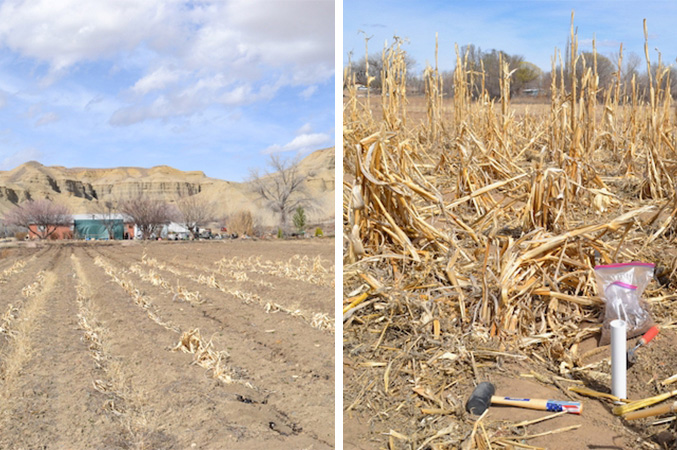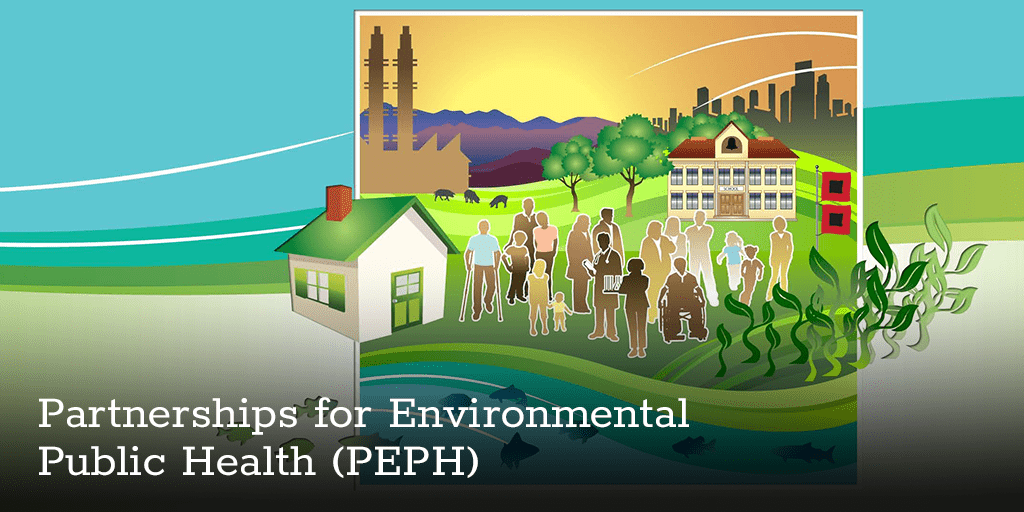Diné community members participate in a listening session. (Photo courtesy of Paloma Beamer, Ph.D.)
NIEHS-funded researchers and Navajo (Diné) community partners incorporated Indigenous philosophies and worldviews into the development of focus groups to examine the effects of an environmental disaster on the Navajo Nation. In 2015, the Gold King Mine Spill released contaminants into a river that runs through the Navajo Nation. Researchers sought to examine the impacts of the spill on the Diné community. A recent publication describes how they developed and implemented the focus groups and analyzed resulting information to gain insight into conducting research with Indigenous communities.
Karletta Chief, Ph.D., co-principal investigator with the University of Arizona, described how the project started: “After the Gold King Mine Spill, the Navajo Nation Environmental Protection Agency reached out to the Community Engagement Core of the Superfund Research Program at the University of Arizona for assistance to determine the impact the spill would have on the Diné community. We listened to community concerns through forums, public meetings, and listening sessions. As a result, we developed research concepts and submitted them for review by the Navajo Nation Environmental Protection Agency and Navajo Nation Department of Water Resources. Once the research was approved by the Navajo Nation Human Research Review Board, Diné community partners worked with us to develop focus groups that would help understand the impacts of the spill on Diné communities. We owe the success of the focus groups in large part to our Diné community partners and Jeannie Benally of the University of Arizona Tribal Cooperative Extension.”
Community Partnerships Build Trust in the Indigenous Community
The research was part of the Gold King Mine Spill Diné Exposure Project and was conducted in partnership with the Northern Arizona University, Navajo Nation, Navajo Community Health Representatives, Tó’ Bee NihiDziil, Diné College, the University of Arizona Tribal Cooperative Extension, traditional knowledge holders, community leaders and advocates, and Diné community members.
Diné community partners participated in all aspects of the project, leading to community buy-in and trust.
“We are well aware of distrust in research and non-Indigenous researchers due to past injustices, and yet knew that the community questions about the impact of this devastating spill needed to be answered in a culturally-responsive approach”, stated Paloma Beamer, Ph.D., co-principal investigator with the University of Arizona. “The community partnerships and buy-in were essential for making this research possible. Because of the trust-building among community members, we had more authentic responses that went beyond physical health concerns and allowed us to get a better understanding of the cultural and spiritual impacts.”
University of Arizona researchers held listening sessions in each community to inform development of the focus groups. They also presented the research proposal to Navajo chapters, or individual geographical entities within the Navajo Nation, for approval, and the Navajo Nation president and vice president provided their support.
Diné and fluent Diné language speakers led the focus groups, and Diné and non-Diné students, faculty, and community members supported the focus groups. Cultural experts were consulted to guide teams through focus group methods.
Adapting Focus Groups to the Diné Community
Diné researchers, traditional knowledge holders, and medicine people played an important role in ensuring Diné philosophies and worldviews were incorporated in the focus groups. The project used the two-eyed seeing approach, which is a way of adapting non-indigenous research practices to Indigenous culture. This approach recognizes that Indigenous cultural practices are of equal importance to non-indigenous research methods.
Diné cultural experts advised the researchers on incorporating a key Diné cultural concept, called K’é, in the design, conduct, and analysis of the focus groups. K’é is a way of honoring relationships to others and the natural world. Following this cultural guidance, researchers incorporated practices into the focus groups by beginning sessions with formal greetings in which Diné team members acknowledged their family ties and parental lineages, while non-Diné team members offered a similar greeting. This practice established that these sessions were conducted in the context of Diné culture and values.
“Through the guidance of the Diné partners, we knew the community would be more receptive to participating in the research and sharing their concerns when it was clear that Diné values were being honored in the focus groups”, added Chief. “Practices such as the formal greeting, offering a Diné prayer, and translating all statements into Diné and English, firmly grounded the focus groups in the culture and established a trusted space for participants to voice their concerns in the context of their culture.”
Determining the Socio-cultural Impacts of the Mine Spill
Focus group questions were framed with Diné values and concerns in mind. Researchers asked questions about community members’ relationship with the river and with farming. For example, researchers asked how the community members thought the river would be used in the short- and long-term, and what they would like to see for the river in the future.
Participants expressed concern for long-term changes to the culture as a result of the spill, such as whether the community would be able to continue traditional farming and ranching, and whether their children would move away from the area and lose connection with families and traditions. Participants spoke about spiritual concerns related to river access and to crops used in traditional practices whose growth may now be threatened. Community members also expressed concerns about mental health risks.

After the spill, corn fields on the Navajo Nation remained unplanted during the usual re-planting season while irrigation systems pulling water from the contaminated river were shut off. (Photos courtesy of Paloma Beamer, Ph.D.)
“Focus group participants were candid about their concerns and openly discussed the spill in a cultural context”, stated Beamer. “It was apparent that the community sees a wide range of impacts from the spill, including impacts on preserving their way of life and to the wildlife. The spill is viewed as a recent example in a long history of offenses to the community.”
Nicolette Teufel-Shone, Ph.D., co-principal investigator with Northern Arizona University, said, “Having Diné and non-Diné data analysts and authors from the Navajo Nation, community organizations, and the universities was critical to ensure that focus group participants’ perspectives were conveyed within the cultural context in which they were shared.”
The results were presented to Navajo Nation leaders and will be used to help the community mitigate the impacts of the spill. As another outcome of the research, Navajo Nation leaders expressed interest in hearing community members’ concerns to address and plan for emergencies in the future. Trust built through this collaborative project has also led to future opportunities for the researchers and partners, including training students on how to work with Indigenous communities and addressing additional community concerns such as food sovereignty and COVID-19 pandemic response.
Source link
www.niehs.nih.gov


